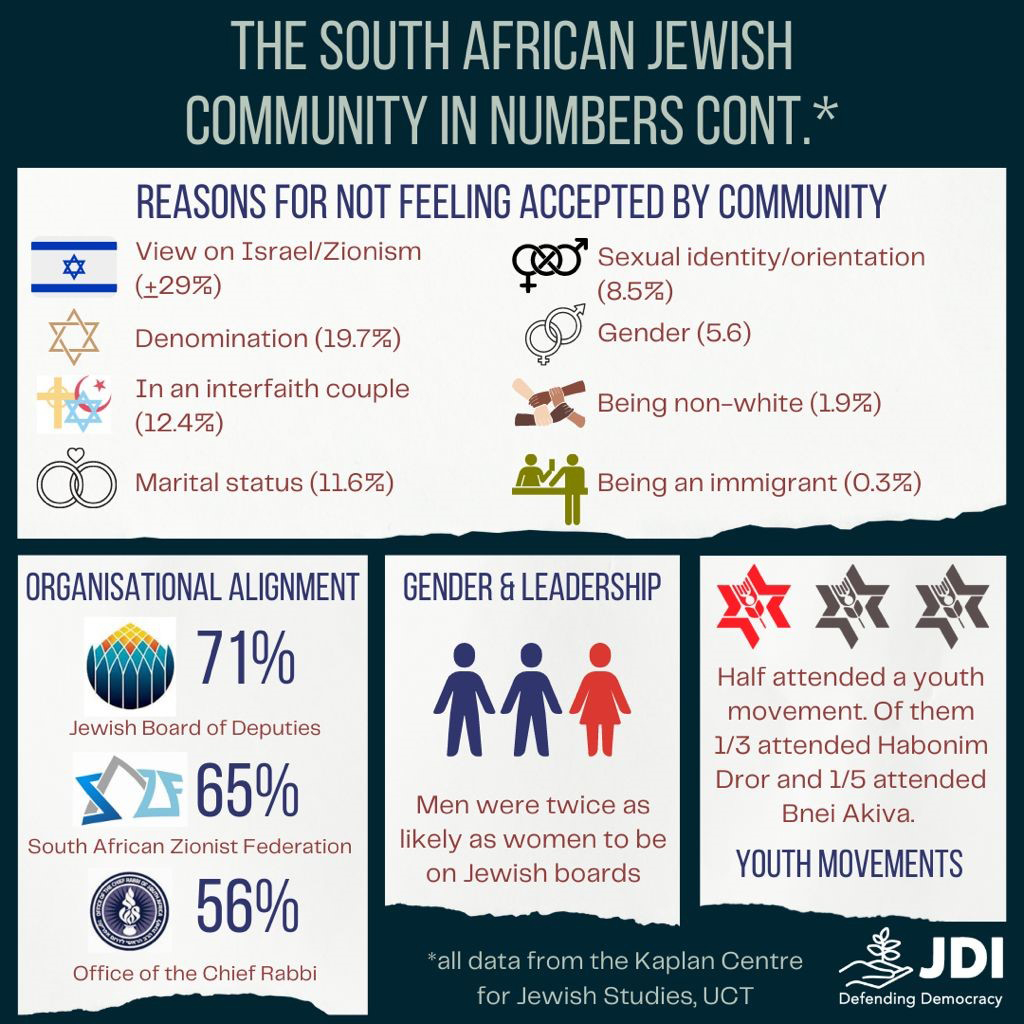
Community

Staying in SA should about “staying for good”, say young Jews
Young Jews need incentives to stay, succession planning, a stronger connection to South Africa, and acknowledgment of different identities if the community is to stem the tide of emigration. This was the message of a recent webinar titled, “Staying for good: South African Jews, migration and our civil commitments”, hosted by the Jewish Democratic Initiative (JDI).
The event took a deep dive into the motivation for migration and the factors that could accelerate or slow the tide. “We didn’t need a survey to tell us that the South African Jewish community has an emigration problem, but these numbers are certainly a wake-up call,” said one of the event’s speakers, Professor Adam Mendelsohn, the director of the Kaplan Centre for Jewish Studies. He was referring to the Kaplan Centre survey of the South African Jewish community that took place in 2019, which showed that 43% of those surveyed indicated they had considered leaving South Africa permanently in the previous 12 months.
“There are now more South African-born Jews born outside of South Africa than within South Africa,” noted Mendelsohn soberly. This means that even more South African Jews may join families and networks overseas. At the same time, the aging nature of the community may put a break on migration, as the older people are, the less likely they are to leave. But he believes that South African Jewry may soon dip below 50 000 people, a truly “psychologically significant milestone”.
Delving into the discoveries made by the Kaplan Centre’s survey, Mendelsohn highlighted increased levels of Jewish education over the past 20 years as a reason for Israel being the preferred destination for emigration for South African Jews, as opposed to Australia, the top choice 20 years ago. Also, with the South African Jewish community being an aged community, Israel is a destination that accepts older immigrants.
The survey reveals that a startling 51% of those surveyed would move to Israel if they left. Though the community will always see aliyah as a positive move, there is equal concern about shrinking numbers within South Africa. So, what can we do about it?
Two young people emphasised that it wasn’t all bad news. Community member Ashley Fischhoff says her Jewish identity is one of the reasons she chooses to stay. She is a South African research chairs initiative fellow of the University of the Western Cape through the Institute for Poverty, Land and Agrarian Studies.
“Being part of a youth movement was significant for me,” she says. “It made me challenge what it means to be a Jew in the diaspora. Our history of displacement and dispossession made me feel a greater connection to South African history, and a greater sense of responsibility to work towards justice. I feel like South Africa’s my home, and my Judaism is a strong reason why I feel so committed.”
JDI director and incoming Cape Town co-chair for Limmud South Africa, Gabriella Saven, says “staying for good – as in forever” also needs to be about “staying for good – as in making a difference”. As a young person, she’s concerned that South African youth don’t feel connected to wider society. Anecdotally, she has seen peers emigrate because they feel they cannot escape the “Jewish bubble” in South Africa, but overseas, they can see themselves living in a more integrated way.
“Young Jews want to find inclusive communities. They also lack a socio-cultural connection to South Africa,” which means they are less committed to staying and feel less of a sense of belonging to South Africa. In contrast, a strong Jewish education may mean that they feel more of a sense of belonging in Israel. Though this is positive, Saven believes that ties to South Africa need to be strengthened if young Jews are going to have the incentive to stay.
In addition, there’s a “level of disconnection from the Jewish community for those who don’t fit a narrow mould”, she says. These include LGBTQI+ (lesbian, gay, bisexual, transgender, queer, and intersex) Jews or Jews in interfaith or interracial relationships. With our numbers shrinking, we cannot afford divisions and not allowing every identifying Jew inside our tent. Ironically, these divisions often get deeper the smaller a community gets.
“Democratisation of society needs to include our own democratisation process,” says Saven. “In some ways, we are very progressive, in some ways not. If we don’t open our institutions to varying identities, then we will be left behind as young people choose Jewish communities that do offer these things.”
Fischhoff says being a young Jew in South Africa today isn’t easy, and the community needs to acknowledge the many complexities young Jews face as they think about their place in the world. “We are living in an era dominated by identity politics, and that needs to be addressed. It’s really challenging to be a young South African Jew. Having been victims of persecution, living in a country built on apartheid injustice, and being criticised that your other homeland is a perpetrator of injustice all leads to a lot of internal conflict. Not engaging with that and the youth meaningfully is setting us up for failure.”
In addition, “comprehensive succession planning”, as is being done in Cape Town, is crucial for a stable communal future. In addition, “we need to encourage and facilitate engagement with South African identity from a young age”.
If we are here, we cannot live in an isolated and disconnected way, Saven says. Though the examples of Jewish involvement in wider society are admirable and endless, “we have a responsibility to demonstrate that we are committed to the longevity of the country as well as our own communal structures. Commitment to South Africa should be inseparable from a commitment to our own people. We have a lot of work to do if we are going to stay in South Africa. If one of the main ‘pushes’ is government instability, then what are we doing as a community to change that, to make it more safe and stable?” she asks rhetorically.
Mendelsohn says one startling insight from the Kaplan Centre’s research was that grandparents were encouraging grandchildren to leave. But he believes all hope isn’t lost, and “we aren’t at the tipping point yet. We are seeing many counter-currents and new initiatives that are helping the community prepare for the future.”
Audience member Dr Tony Lachman commented that after having lived overseas for 30 years and then returning to South Africa, he thinks that people need to look at emigration with their eyes wide open. He believes opportunity in South Africa is as great as anywhere else, and connectivity to community much stronger in South Africa.
“What happened on 6 January in the United States was frightening, and antisemitism is more blatant in the United States and the United Kingdom,” he said. “As a mentor once told me, ‘Wherever you go, you take yourself with you.’ If you’re not prepared to roll up your sleeves and get involved here, you’re not going to do it anywhere else.”











Karen Saltz
November 20, 2021 at 9:50 pm
I never felt as connected to my community in SA as I do almost 30 years later in Canada.
Living in a country which is made up of immigrants, you are warmly welcomed into any strand of Judaism in the large centres. Being Jewish is our commonality, and becoming involved in and part of a community, fosters belonging and immersion in your adopted society
Yes, you do take yourself with when you leave SA, but you also have the opportunity to re- invent and better yourself as you build a new life. We are constantly evolving, and your attitude will decide how far that goes, no matter where in the world you are located.